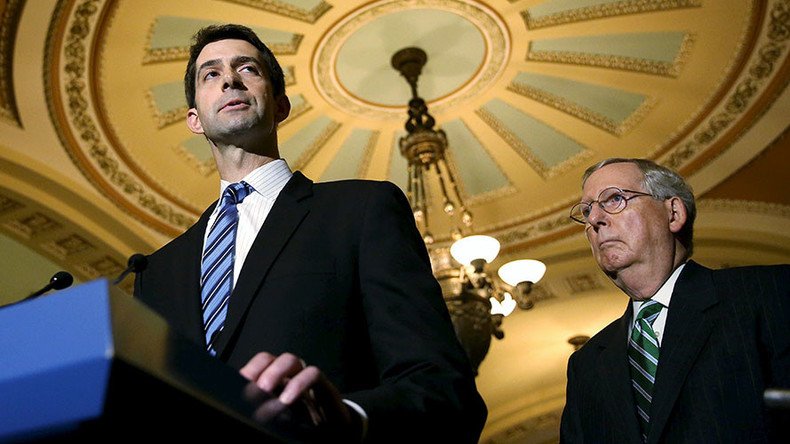‘Poison pill’: Senator’s anti-Iran deal amendment prevents passage of bill keeping government funded

The first of 12 appropriations bills the US Senate must pass to keep the government funded past September 30 suffered a legislative roadblock, thanks to Sen. Tom Cotton (R-Arkansas), infamous for his opposition to the Iran nuclear deal.
Usually bipartisanship is a precursor to approving legislation, not sinking it. But on Wednesday, four Senate Republicans joined with their Democratic colleagues to prevent the passage of an energy and water appropriations bill.
Iranian runner flies US flag in support of absent American athletes (PHOTO)https://t.co/UBZv7MZEQVpic.twitter.com/COrbWKoHLm
— RT America (@RT_America) April 15, 2016
With the fiscal year 2016 ending on September 30, Senate Majority Leader Mitch McConnell has made it his goal to implement a neat and clean process for passing 12 funding bills for the fiscal year 2017, but so far events have not been going according to plan.
The funding failed to get the required 60 votes, with senators voting 50-46 in order to avoid what would have been an imminent follow-up vote on amendments, including one by Sen. Cotton deemed a “poison pill.”
Cotton’s amendment would have prohibited any further purchases of heavy water from Iran as allowed under the US-Iran-led international agreement limiting Iran’s civilian nuclear energy program, which went into full effect this year.
Last Friday, the Obama administration finalized an $8.6 million deal to buy 32 metric tons of heavy water leftover from Iran’s Arak reactor, the Associated Press reported. Heavy water is non-radioactive and has medical as well as other industrial uses, but Iran is restricted on how much it can keep under the nuclear deal.
While President Obama has threatened a veto against any congressional effort to disrupt those transactions, Cotton and his allies claim they were given no notice of Friday’s deal and introduced the amendment to prevent further acquisitions.
“If President Obama intends to make future purchases of Iranian heavy water that will subsidize Iran's nuclear industry, then he should say so,” Cotton said in a statement Wednesday. “His own Secretary of Energy has said there will be no more purchases. But the vehemence with which the White House is opposing my amendment raises the question of whether President Obama is being straight with the American people."
My amendment simply seeks to stop US dollars from going to Iran.
— Tom Cotton (@SenTomCotton) April 27, 2016
Cotton also took to Twitter to respond to White House spokesman Josh Earnest, who said Cotton was determined to sabotage the Iran nuclear deal. Cotton tweeted, "My amendment simply seeks to stop US dollars from going to Iran."
Cotton was the author of an open letter addressed to Iranian leaders and co-signed by 46 other Republican senators. It was sent in the heat of international negotiations and carried veiled threats of the constitutional powers that Congress could exercise against any deal, although the deal has been recognized as an executive agreement, not a treaty with Iran.
Under the $8.6 million buy, the heavy water will be researched or re-sold from the Oak Ridge National Laboratory in Oak Ride, Tennessee.
The Savannah River National Laboratory near Jackson, South Carolina has previously certified Iran’s heavy water’s high purity.
MORE: Iran's central bank to pay victims' families for other terror attacks linked to Tehran https://t.co/LdHDDPOgHIpic.twitter.com/fGtKahhV40
— RT America (@RT_America) April 20, 2016












